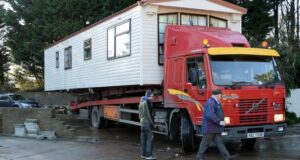Photo: Mobile homes are removed from the halting site at Woodland Park, Dundalk, December 2015.
Pavee Point Traveller and Roma Centre is calling (today 25th August 2016) on Minister for Housing, Simon Coveney TD to use his Ministerial powers and introduce a ban on Traveller evictions until Travellers on local authorities housing lists are provided for.
“Ongoing evictions by local authorities and other public landowners is causing Travellers unnecessary hardship and suffering,” said Martin Collins, Pavee Point Director. “The Minister has a humanitarian responsibility here to intervene.”
“This week alone two separate evictions are taking place in Counties Clare and in Carlow affecting about 30 Travellers including 4 children. And we have ongoing situations in Counties Galway and Louth,” he said.
In one case immediate eviction was averted while in another a family of 8 moved on and are now forced to try and find another place to stop.

“This is getting us nowhere and is just causing torment and hardship. People find a place where they can stop and get set up. Then – out of the blue 48 hour eviction notices are served. Travellers feel like they are being persecuted for simply trying to survive,” said Mr. Collins, “And children’s access to education is affected.”
In July the Oireachtas Housing Committee on Housing and Homelessness recommended a ban on Traveller evictions to Housing Minister, Simon Coveney TD. “No Travellers should be evicted from a Traveller specific site until alternative accommodation is provided,” the report said.
In June six international organisations also called for a ban on Traveller evictions and highlighted the human cost of evictions. “Local authorities need to find sustainable solutions to the housing or accommodation problems many Roma and Travellers face, and avoid evictions” the statement said.
“A constant threat of eviction can result in physical and psychological health problems, such as emotional trauma, as well as lasting social isolation affecting particularly those with vulnerabilities, such as older people, women or those with disabilities.
“Families and communities are torn apart by eviction, which may jeopardize the right to family life. Evictions without rehousing opportunities multiply homelessness and they perpetuate illegal settlements and slums.
“Evictions often stop access to health care and vaccination programmes, increasing the health risks for the entire society.”
These organisations consist of the European Network of National Human Rights Institutions (ENNHRI), the European Network of Equality Bodies (Equinet), the European Union Agency for Fundamental Rights (FRA) and the Council of Europe (CoE), as well as associate partners, including the OSCE’s Office for Democratic Institutions and Human Rights (OSCE/ODIHR) and the UN’s Office of the High Commissioner for Human Rights (OHCHR).

